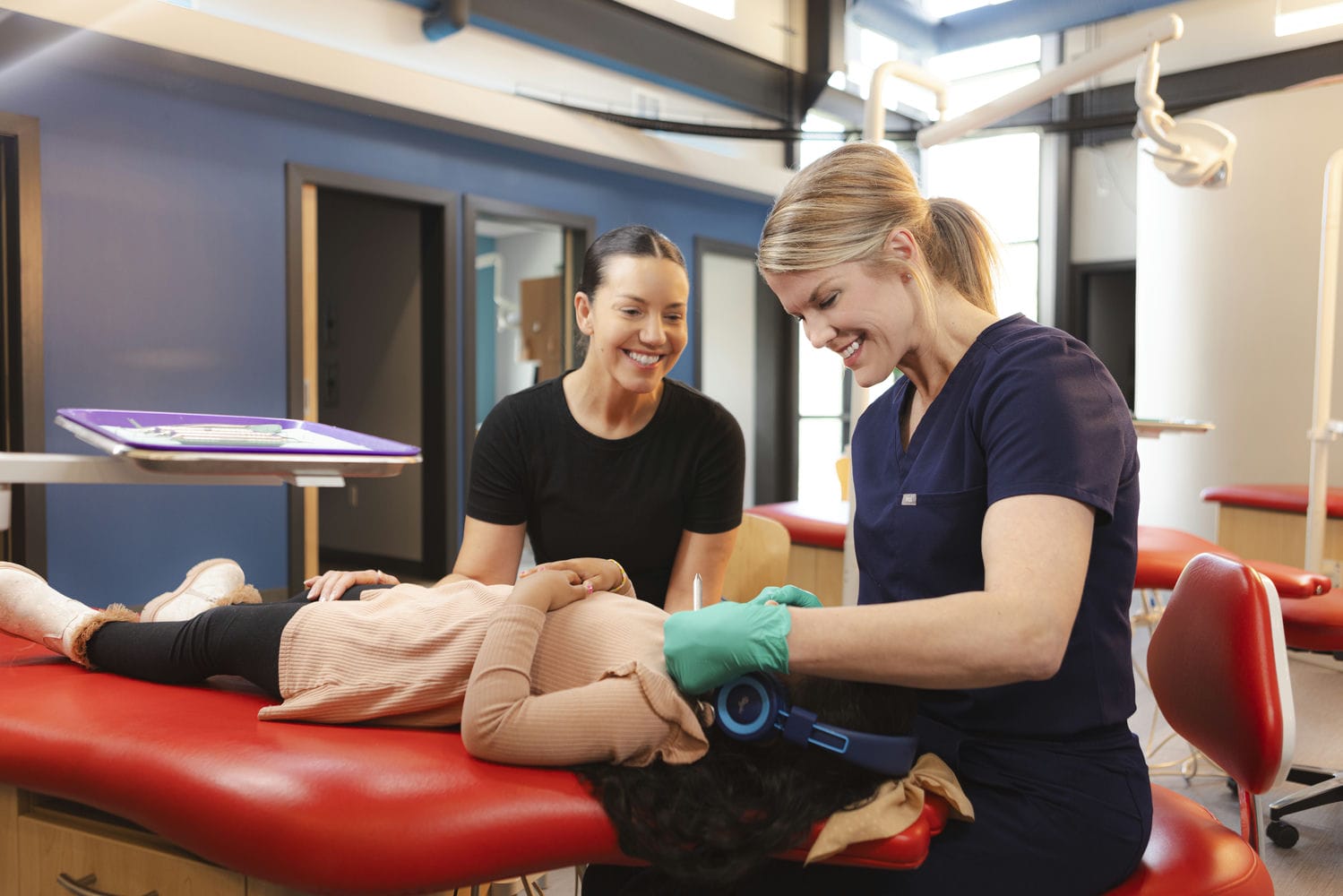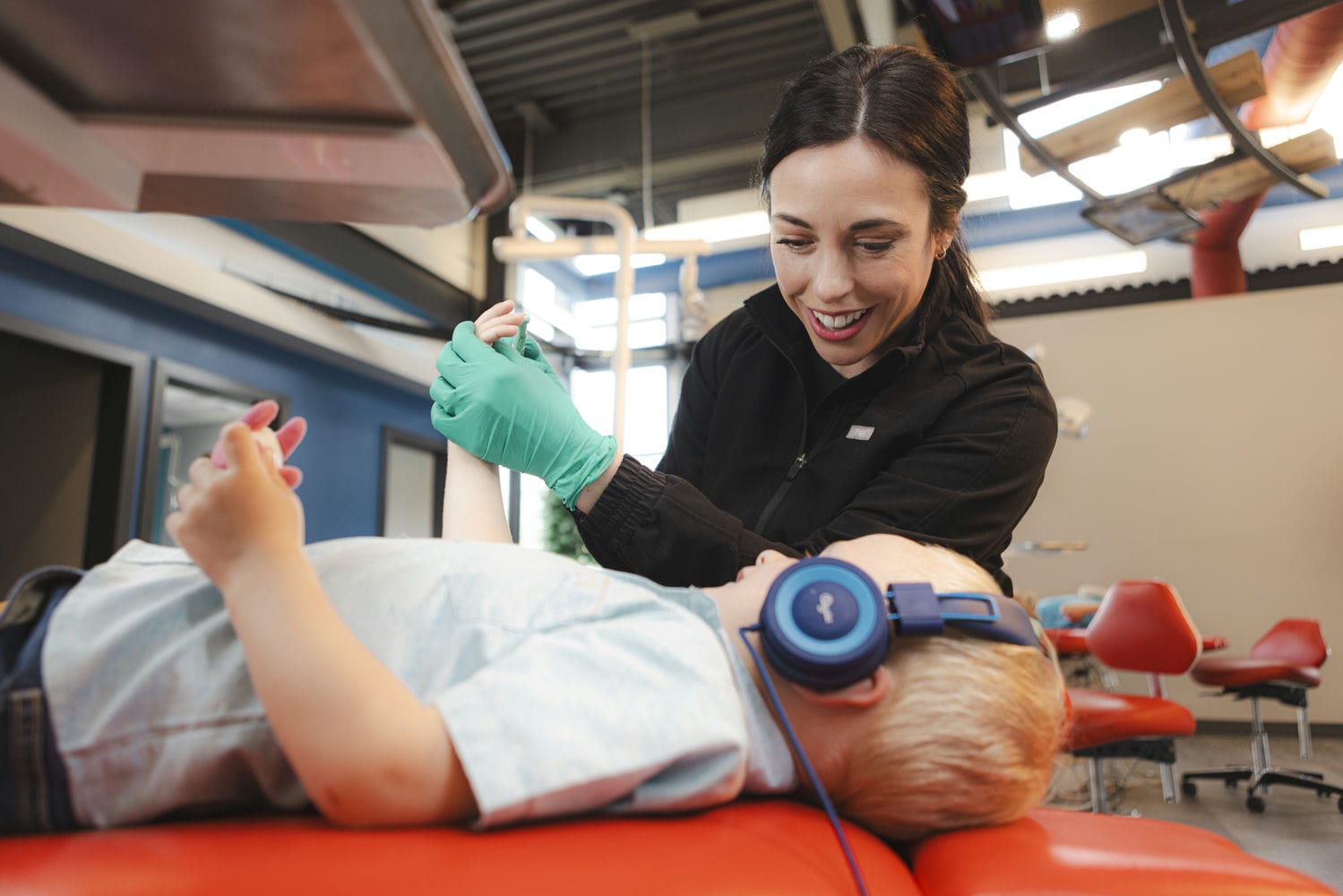frequently asked questions

what can I expect during my child's first visit?
At the new patient appointment the dentist and staff will spend quality time getting to know you and your child. We teach your child to be comfortable with dentistry by explaining the procedures and demonstrating the equipment in a fun and imaginative way. The office visit will include a thorough oral examination, x-rays (we call them pictures) if required, a cleaning and fluoride application. We also emphasize and demonstrate brushing/flossing techniques, toothbrush selection, diet, habits, and need for fluoride supplementation.
A complete review of your child's medical health and any special needs or concerns will also be addressed. More complicated procedures, such as fillings, should be done at a later visit after your child has become familiar with the office.
Your child will also receive stickers, a prize, toothbrush and floss!
when should I begin taking my child to the dentist?
Many parents want to know when their child's first appointment should be scheduled. The American Academy of Pediatric Dentistry recommends a child's first dental visit should be scheduled when the first tooth comes in and no later than their first birthday.
Our office places great emphasis on preventive measures. Cavities in baby or adult teeth may result in pain, swelling, and infection. Children with pain cannot concentrate in the classroom, may develop behavioral problems and are unable to eat properly. Without the ability to eat normally, development of the body and brain may suffer. Regular preventive visits every six months will minimize cavities and other dental problems.
what if my child is uncooperative or has a high level of anxiety?
We strive to make each child as comfortable and relaxed as possible while receiving care. Treatment for each child is individualized depending on the child's needs. While most patients are calm and confident, some patients may need more than a gentle caring manner to feel comfortable. We do offer several options for such patients, which include nitrous oxide and oral sedation.
We offer nitrous oxide (laughing gas) to safely calm your child. Nitrous oxide is very safe and can be very helpful for children who have a sensitive gag reflex. For children unable to cooperate due to anxiety, age or special needs we offer outpatient hospital services. This technique can be especially helpful for children, who are very young, have special needs, or who do not understand how to cope in a cooperative fashion for the delivery of dental care. Our protocols follow the guidelines of the American Society of Anesthesiologists and the American Academy of Pediatric Dentistry.
what is a Pediatric Dentist (Pedodontist)?
In the same way that pediatricians are trained to meet a child's medical needs, our pediatric dental specialists are uniquely qualified to protect your child's oral health, using the most advanced techniques--and all in our delightfully friendly open treatment area. All pediatric dentists complete a 2-3 year postdoctoral residency that prepares them with the knowledge and experiences to treat children and their specific needs.
should I eliminate all sugar and starch from my child's diet?
Of course not. Many of these foods are incredibly important to your child's health. Starch-based foods are much safer to eat for teeth when eaten with an entire meal. Foods that stick to teeth are also more difficult to wash away by water, saliva or other drinks. It is important you talk to our staff about your child's diet and maintaining proper dental care.
what helpful information can you give me regarding tooth decay in infants?
To limit the possibility of cavities, try never to put them to bed with a bottle of milk, juice or formula. When a child is sleeping, any liquid that remains in the mouth can support the bacteria that produce acid and harm the teeth. A simple pacifier or water is fine. Epidemiological research shows that human milk and breastfeeding of infants provide general health, nutritional, developmental, and psychological advantages while significantly decreasing the risk for a large number of diseases. Frequent night time bottle feeding with milk and ad libitum breastfeeding are associated, but not consistently cited as causal, with cavities in young children.
how do I know if my child is getting the appropriate amount of fluoride in their diet?
If you do not reside in a community that has fluoridated water or have the appropriate amount of natural fluoride in your well water, your child will need some sort of supplement in their diet. We can help you determine how much of a supplement your child needs based upon their weight, age, current water fluoride levels and brand of toothpaste.
what can I do about teeth grinding?
Some parents may hear their children grind their teeth at night or may begin to notice wear on their teeth (their teeth may appear to be getting shorter). Some reasons for grinding teeth include stress or pressure on the inner ear. If there are changes in pressure (like in an airplane in take off and landing) the child may grind their teeth to relieve this pressure. Another cause may be due to the eruption of primary teeth at different times. Children may also grind to develop an even bite. Most children outgrow their grinding, with no treatments necessary. If the problem persists, discuss it with your doctor at your child's next visit.


is it OK that my child sucks his/her thumb?
Sucking is a natural reflex and infants and young children may use fingers, thumbs, pacifiers and other objects on which to suck. It may make them feel secure or provide a sense of security. Thumb sucking that persists beyond age four can cause problems with correct growth of the mouth and tooth alignment. The frequency and intensity of the sucking will impact any dental problems.
Children should stop sucking their fingers or thumb by the age of two and four. Children should stop sucking pacifiers around 18 months of age.
A few ideas to help your child stop finger/thumb sucking include the following:
- Praise your child when they are not sucking their thumb/fingers
- Children suck their thumbs when they feel insecure. Focus on and address the cause of anxiety rather than the thumb sucking.
- Reward children when they are not thumb sucking. Download and print our reward calendar Let the child place a sticker on each day he/she has not sucked his/her thumb/fingers.
- During your child's dental visit, your doctor can encourage children not to sick their thumb and explain what could happen if they continue.
- If these approaches don't work, try placing a sock over your child's hand at night and use with a reward calendar.
- Lastly, your doctor may recommend the use of a mouth appliance.
what is the baby bottle decay?
Baby bottle decay is caused by frequent and long exposure of an infant's teeth to liquids that contain sugar. These liquids include milk, breast milk, juice and other sweetened drinks. After each feeding, parents should wipe their baby's gums with a damp cloth to prevent plaque.
Putting a baby to bed or for nap with a liquid other than water can cause tooth decay. Sweet liquid pools around the child's teeth, giving plaque and bacteria a chance to produce acids that attack tooth enamel.


